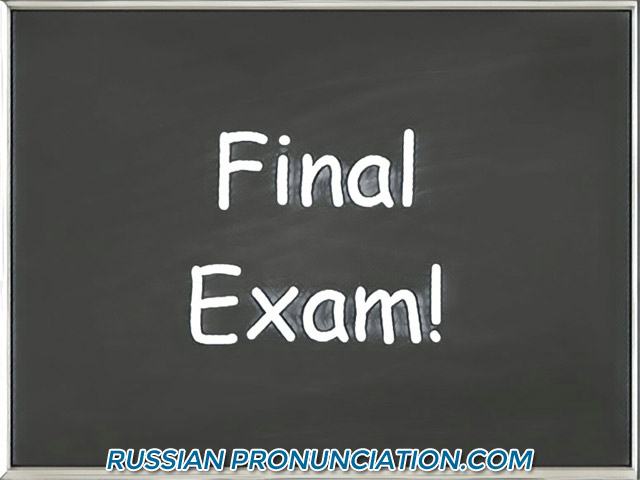
Full Episode Audio
Exercises Only Audio
Download Full Episode (right click save-as)
Welcome to episode 20 – the final exam. You should feel proud for having made it this far. It’s a small course, but still…you put in the time and effort. After this exam you should treat yourself to something..I recommend Russian blini. Ever try them? Блины are basically crepes—very thin pancakes, usually filled with some jelly or sweet cheese inside. They’re a Russian delicacy. In fact, try to say…
I want to cook (or, more literally, ‘prepare’) blini.
Я хочу приготовить блины.
Speaking of popular Russian foods, have you ever tried пельмени? They’re basically dumplings filled with meat…usually pork. Here’s the word again. пельмени
So try to say: I want to cook dumplings.
Я хочу приготовить пельмени.
With two words, ask your roommate: Want shishkabob?
Хочешь шашлык?
Want dumplings?
Хочешь пельмени?
He shrugs and says the Russian word for, Okay.
Хорошо.
Moving on: Try to say: My mother lives in Odessa.
Моя мама живёт в Одессе.
My dad lives in Kharkov.
Мой папа живёт в Харькове.
Anastasia is traveling to Dubai.
Анастасия едет в Дубай.
I’m traveling to Munich.
Я еду в Мюнхен.
Speaking of traveling, say: In New York I want to see Times Square.
В Нью Йорке я хочу увидеть Таймс Сквер.
Quick quiz on voicing and devoicing. Imagine these three Russian letters: В-С-Е
How will that word be pronounced? Will the ‘В’ be voiced?
все
It was devoiced because, if you remember that pattern, the last letter in a cluster determines whether your vocal cords are involved. Right? So, since the ‘S’ sound (С) is naturally devoiced, it affects the “v” sound that comes before it. So not “V-syeh” but an “F” sound: Fsyeh
And we’re going to need that word, which means “all”, in this next sentence.
I want to see all the main tourist sites in Paris.
Я хочу увидеть все достопримечательности в Париже
Try that again. I want to see all the main tourist sites in Amsterdam.
Я хочу увидеть все достопримечательности в Амстердаме.
I think that was the longest sentence in the whole course.
In your studies, you’ve probably encountered the word кафе, which is how Russians pronounce cafe. So try to say: I’m going to the cafe. (implying, on foot)
Я иду в кафе.
Now that word we use for “to” the cafe…it’s the letter В. But was it voiced or no? Say the phrase again: I’m going to the cafe.
Я иду в кафе.
So it was devoiced. But why? Because the letter that follows, the ‘k’ of cafe is naturally devoiced. And even though it’s a separate word, in Russian, prepositions like “to, from, for” and so on, are treated as if they are part of the word that follows. We do that in English too, right? We say:
I’m going t’McDonalds. We don’t say: I’m going **to** McDonalds. The word “to” basically gets absorbed into the beginning of McDonalds.
Say: I’m going to the park.
Я иду в парк.
Again, ‘В’ is devoiced because of the ‘П’ in парк. Now say…
I’m going to Burger King.
Я иду в Бургер Кинг.
There, the ‘В’ is voiced…В Бургер Кинг…because the ‘Б’ in Бургер is naturally voiced.
How will your friend ask: Where is Burger King located?
Где находится Бургер Кинг?
Tell her: Burger King is located downtown.
Бургер Кинг находится в центре.
Let’s try this. Two phrases: I’m going to the cafe. I want dumplings.
Я иду в кафе. Я хочу пельмени.
The word for a mini-market in Russian is an easy cognate. Listen…
мини-маркет
So try this: I want yogurt. I’m going to the mini-market.
Я хочу йогурт. Я иду в мини-маркет.
Before the word мини-маркет…was that В voiced?
I want a magazine. I’m going to the mini-market.
Я хочу журнал. Я иду в мини-маркет.
Next…Try to say: Taras was in St. Petersburg.
Тарас был в Санкт-петербурге.
Imagine that your friend is a violinist and she, somehow, misplaced her instrument. It’s not in the car, not in the hotel…and then she finds it. How will she say:
The violin was in the theater.
Скрипка была в театре.
Of course, because Скрипка ends with an “ah” sound, making it feminine, she used the feminine past tense—была—to match. (Or to rhyme, really.)
Let’s try that phrase again, but add an expression of relief.
Thank God. The violin was in the theater.
Слава Богу! Скрипка была в театре.
Next: How do we convey the idea that: I like rock…as in, rock music.
To me….is pleasing….rock.
Мне нравится рок.
Say: I like jazz.
Мне нравится джаз.
The final letter was a Z (З), which is normally voiced. But, being at the end of the word, Russians devoice it.
Say: I really like jazz. To me…very pleasing…jazz.
Мне очень нравится джаз.
One last example of devoicing the final consonant…What’s the Russian version of Oh, my God?
О, мой Бог.
That final letter is a G (Г)…normally voiced as.’guh’… but that’s the pattern in Russian. They get devoiced at the end of a word.
Speaking of endings…We’re at the end, not only of this exam, but of the whole course.
Hopefully, though, this isn’t goodbye. I have two other podcasts that you can get.
Russian Made Easy
…and my newest one…
Understanding Spoken Russian.
Or, if you want to really speed things up, then I hope you’ll join my Russian Accelerator course. We’ll get you conversational in Russian in just a few months. See you soon!
До встречи
Podcast: Play in new window | Download

